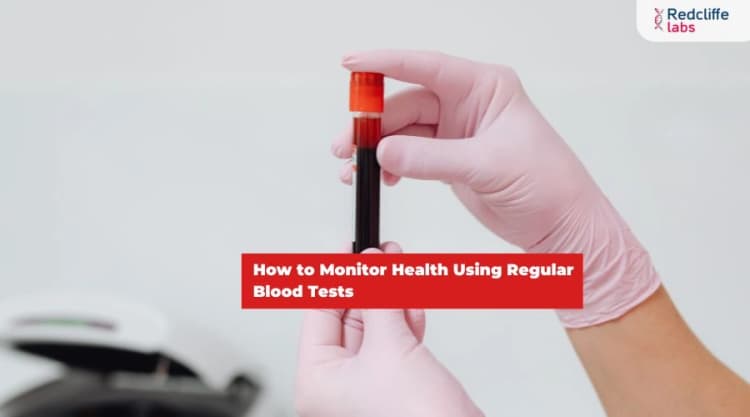The Anti-Thyroid Peroxidase Antibodies (TPO) Test is...Read more
Blood
Unlock special
discount on
this package
Login to Unlock 🔓
Also Known As
Anti TPONABL Accredited lab*

Booking Benefits Unlocked Worth FREE 799

Report Consultation

Diet Plan
*Available once your report is generated.
At Redcliffe Labs, we have a single goal: to give India its right to quality diagnostics.
Customers served
Tests Processed Everyday
Cities
Collection Centres
World Class In-house Labs
Home Collection Experts
1 Test Parameters
Anti TPO
1 PARAMETER INCLUDED
1 PARAMETER INCLUDED
- Anti TPO
Top Booked Health Checkup Packages
Reports in 12 hours
|Parameters 94
Reports in 12 hours
|Parameters 89
Reports in 12 hours
|Parameters 96
Reports in 12 hours
|Parameters 96
Reports in 12 hours
|Parameters 90
Helps you know your test better
Q. What is an Anti-Thyroid Peroxidase (TPO) Antibody test?
Q. What causes anti-TPO antibodies to rise?
Q. How do you prepare for this test?
Q. What is the anti-TPO test cost ?
Verified by Medical Expert

WRITTEN BY
Sheena Mehta

MEDICALLY REVIEWED BY
Dr. Pradeep Lodha
Introduction to Anti-TPO test
TPO is an enzyme produced by your thyroid gland. It plays a crucial role in the production of thyroid hormones, which help to regulate various body functions like metabolism, heart rate, and body temperature.
The Anti-TPO test, also known as the Thyroid Peroxidase Antibody test, is a blood test used to detect the presence of antibodies against an enzyme called thyroid peroxidase (TPO) in the blood. The immune system doesn't attack healthy tissues. However, in some cases, it mistakenly produces antibodies that target the TPO enzyme in your thyroid gland. This is known as an autoimmune reaction.
If you are experiencing symptoms like fatigue, weight gain, feeling cold, dry skin, anxiety, insomnia, and rapid heartbeat, these all signs indicate a thyroid disorder. Your doctor may recommend the Anti-TPO test if you experience thyroid disorder symptoms or have abnormal results on other thyroid function tests, like TSH. You can take the Anti-TPO test from Redcliffe Labs
Test details in brief
| Also Known As | Thyroid Peroxidase, TPO, Anti-TPO Antibodies, Thyroid-Stimulating Antibodies, Thyroid-Stimulating Immunoglobulins, Thyroid-Stimulating Hormone Receptor Antibodies, TSH Receptor Antibodies, Thyroid Autoantibodies |
| Purpose | This checks TPO antibodies & thyroid disorders risks and helps identify its causes. |
| Preparation | Do not take any over-the-counter medicine without confirming with your Doctor. |
| Fasting | No Fasting Required |
| Get Reports | Within 24 hours |
| Cost | ₹1199 - ₹1500 |

What is the Anti-TPO test used for?
An anti-TPO test is done because:
- It helps assess overall thyroid health and checks for the underlying causes of thyroid dysfunction.
- Your healthcare provider may suggest a test to diagnose thyroid autoimmune disease. The autoimmune disorder of the thyroid develops when antibodies begin to attack the thyroid tissues of the body, causing redness, swelling, and health complications.
- The anti-TPO test also helps monitor the progression and effectiveness of treatment for autoimmune disorders.
- Additionally, the test helps assess the risk involved in thyroid disorders in the future.
- Nevertheless, the test distinguishes between autoimmune disorders and other causes of thyroid dysfunction, such as goiter.
Purpose of the Anti-TPO Test
The thyroid antibody test is used to detect the hypothyroidism or hyperthyroidism condition. Hypothyroidism is referred to as an underactive thyroid gland, while hyperthyroidism is referred to as an overactive thyroid gland. The test is used for the following purposes-
- The test helps to detect Hashimoto's Thyroiditis, which leads to decreased thyroid hormone production.
- This helps to detect the condition called hyperthyroidism that may lead to Graves' Disease.
- High anti-TPO levels suggest an autoimmune cause for thyroid dysfunction, helping differentiate it from other causes like iodine deficiency.
- The test can be used to monitor the effectiveness of treatment for Hashimoto's disease.
- In some cases, anti-TPO antibodies may be associated with fertility issues in women.
- In some cases, anti-TPO antibodies may be associated with fertility issues in women.
- If you have a family history of thyroid problems, the test might be used to assess your risk.
- The thyroid anti-TPO test confirms whether you have already been treated for thyroid cancer.
- The test also helps identify hypothyroidism. It is a condition that occurs due to reduced thyroxine hormone synthesis.
- The test also helps assess the possible risk involved in the fetus in pregnant women with thyroid illness.
- The anti-TPO helps determine whether you have an autoimmune thyroid condition or a non-autoimmune goiter.
- Nevertheless, the test helps detect idiopathic myxedema. Although rare, it is an extreme form of hypothyroidism that occurs when the mucopolysaccharides accumulate in the skin and tissues, leading to swelling (edema).
When should I get this anti-TPO test?
The anti-TPO test is done to diagnose an autoimmune condition affecting the thyroid. It is thyroid antibody testing, and you should get it done in the following circumstances:
- Unexplained reason for hyperthyroidism: A physical exam and a thyroid hormone test may confirm the presence of an overactive thyroid, which may indicate Graves’ disease. Additionally, ultrasound and radionuclide thyroid scans may also be performed to diagnose Graves’ disease.
- Subclinical hypothyroidism: The test also helps find out if they have high TSH and normal FT4 levels. Such conditions will lead to more severe hypothyroidism or remain subclinical without clear symptoms.
- Goiter: The Thyroid gland enlarges abnormally, even if your thyroid hormone levels are normal. Your healthcare provider may suggest testing for TPOAb.
- To monitor the treatment for thyroid cancer, The anti-TPO test may be suggested to monitor if the autoimmune thyroid diseases are progressing and the effectiveness of the treatment.
What does the Anti-TPO test measure?
The Anti-TPO test measures antibodies in your blood, specifically targeting Thyroid Peroxidase (TPO), an enzyme your thyroid gland produces. These antibodies are called anti-thyroid peroxidase Antibodies. Your body starts making antibodies when your thyroid cells become damaged. The presence of anti-thyroid antibodies increases your risk of thyroid disease.
Your immune system doesn't attack healthy tissues. However, in autoimmune thyroid disorders, the immune system mistakenly produces antibodies that target the TPO enzyme, disrupting its function and potentially affecting thyroid hormone production. Thyroid peroxidase is an enzyme also stimulated by TSH.
Preparation for the Anti-TPO test
The anti-TPO blood test is simple and, hence, does not require any special preparation. Here is what you must know and follow before the test-
- No fasting is required. The anti-TPO blood test requires no fasting. You can eat and drink as per your daily routine.
- Medications- Consult all your medications and supplements with your doctors; they might affect your test results.
Wear comfortable clothing. If you have any concerns about the anti-TPO test, consult your doctor before the test.
The procedure of the Anti-TPO test
Here is the step-by-step procedure of the Anti-TPO blood test-
- Step 1- The phlebotomist will tie a tourniquet or the band around your arm to locate the vein.
- Step 2- Next, the healthcare provider will clean the arm area with an antiseptic solution to minimize the risk of infection.
- Step 3- After that, he will use a sterile needle to collect the blood. You might feel slight pain when the needle enters.
- Step 4- He will collect the blood into a vial or tube. You might feel a slight pulling sensation during this step.
- Step 5- Once enough blood is collected, the phlebotomist removes the needle and applies pressure to stop bleeding.
- Step 6- Next, he will put a bandage or cotton gauze at the puncture site to stop bleeding.
The entire procedure usually takes less than 10 minutes. You might feel slight discomfort or bruising at the puncture site, but this is normal.
What do the Anti-TPO test reports indicate?
After the sample collection, the blood test reports will be available within 24 hours. The test results are complex to interpret as the normal results may vary from different laboratories. Consult your test reports with your doctor. Here is what your anti-TPO blood test results may show-
If your test results show abnormal levels of thyroid antibodies, it might be due to an autoimmune disorder.
- Negative Result- The Anti-TPO normal range is less than 9.0 IU/mL. This indicates a low concentration of thyroid peroxidase antibodies in your blood.
- Positive Result- A positive Anti-TPO test result indicates the presence of antibodies against thyroid peroxidase. This can be associated with autoimmune thyroid disorders-
Hashimoto's Thyroiditis- This is the leading cause of hypothyroidism (underactive thyroid).
Graves' Disease- This condition can cause hyperthyroidism (overactive thyroid).
TPO antibodies are present in more than 90% of patients with hypothyroidism and 10% who do not have thyroid problems. These antibodies are high in 95% of Hashimoto's thyroiditis patients and 70% of Grave's disease. Even if you don't have thyroid disease, you might have TPO antibodies.

Who should take the Anti-TPO test?
Your doctor may advise the thyroid antibody test to identify the following situations:
- Hypothyroidism (underactive thyroid)- Fatigue, weight gain, feeling cold, dry skin, hair loss, irregular or heavy periods, depression.
- Hyperthyroidism (overactive thyroid)- Weight loss, anxiety, insomnia, rapid heartbeat, heat intolerance, diarrhea, hand tremors.
- Subclinical hypothyroidism- If TSH is high and FT4 is normal, then testing for TPO will help to identify whether it's the beginning of hypothyroidism.
- Goiter- This is the abnormal enlargement of the thyroid gland. Your doctor may recommend TPOAB testing if you have a goiter, even if your thyroid hormone level is normal.
- Abnormal Results on Other Thyroid Tests- If your thyroid function tests, like TSH (Thyroid Stimulating Hormone), show abnormal levels, further diagnosis with an Anti-TPO test might be needed.
What are the common symptoms of Thyroid?
Your doctor may advise the thyroid antibody test to identify the following situations:
Common symptoms for Hashimoto's Thyroiditis:
- Weight gain
- Depression
- Joint Pain
- Fatigue
- Hair loss
- Low tolerance to cold
Common symptoms of Graves disease-
- Weight loss
- Bulging eyes
- Tremors
- Anxiety
- Swollen thyroid
- Low tolerance to heat
- Swollen thyroid (Goiter)
What is the risk associated with the anti-TPO test?
The risks associated with the anti-TPO test are as follows:
- The risk involved with the anti-TPO test is that people with TPO antibodies are at a higher risk of thyroid disease after pregnancy.
- As the anti-TPO test is a standard blood test, some possible risks include pain, bruising, or bleeding at the puncture site. Additionally, in rare cases, prolonged bleeding may also occur if you are taking blood-thinning medications. Consult your doctor to get immediate medical treatment.
What does the anti-TPO test detect?
The anti-TPO (anti-thyroid peroxidase) test detects antibodies against thyroid peroxidase. It is an enzyme in the thyroid gland that produces thyroid hormones.
- Thyroid-autoimmune disorders: The anti-TPO test detects thyroid autoimmune disorders such as Hashimoto's thyroiditis and Graves’ disease. Hashimoto's thyroiditis is an autoimmune disorder that causes hypothyroidism. Graves’s disease causes hyperthyroidism and can be associated with high anti-TPO levels.
- Risk of developing thyroid disorders: Sometimes, thyroid hormone levels (T3, T4, and TSH) are normal. However, high anti-TPO levels may indicate an increased risk of thyroid dysfunction in the future.
- Causes of unexplained symptoms: Additionally, an anti-TPO test is suggested when you experience persistent fatigue, unexplained weight changes, or neck swelling. All these symptoms could signal thyroid issues associated with autoimmune conditions.
Why is the anti-TPO test Important?
The anti-TPO test is important because it provides detailed information about thyroid health. It helps diagnose and manage autoimmune thyroid disorders.
If suggested, you should not delay and get yourself tested because
- Early detection of autoimmune thyroid diseases: High anti-TPO antibody levels indicate that the immune system attacks the thyroid gland, causing hypothyroidism or hyperthyroidism.
- Clarifies unexplained symptoms: The anti-TPO test helps confirm if symptoms such as extreme fatigue, mood swings, or hair thinning have occurred due to autoimmune thyroid disease.
- Monitors disease progression: If you are already diagnosed with autoimmune thyroid disorders, the test helps monitor the progression of the disease.
- Screens people with a family history of thyroid disease or autoimmune disorders: The test can help identify potential thyroid issues.
- Predicts the risk for thyroid dysfunction during pregnancy and postpartum thyroiditis: The test can help pregnant moms identify and manage thyroid dysfunction during pregnancy. It predicts the risk of postpartum thyroiditis.
- Guides treatment decisions: High anti-TPO levels require an expert’s intervention. The expert will review your reports and help you create a personalized management plan. This plan may include lifestyle adjustments and regular monitoring.
Who should take the anti-TPO test?
The anti-TPO test detects autoimmune thyroid conditions such as Hashimoto's thyroiditis or Graves' disease. It confirms the presence of antibodies against thyroid peroxidase. It is an enzyme that produces thyroid hormones. Individuals who might be suggested the anti-TPO test include:
- People with symptoms of thyroid dysfunction: Individuals with symptoms of hyperthyroidism or hypothyroidism, which indicate abnormal thyroid function, should get tested immediately.
- Family history of thyroid or autoimmune disorders: If someone has a family history of thyroid dysfunction or autoimmune diseases, a healthcare provider may also suggest a test.
- Pregnant women: Females with a history of thyroid issues or autoimmune diseases may be likely to get tested for the anti-TPO test. The risk for antibodies during pregnancy increases and may cause complications such as miscarriage, premature birth, or postpartum thyroiditis.
- Women experiencing infertility or continuous miscarriages: Females having fertility issues or pregnancy complications may need the test.
- Unexplained symptoms with normal thyroid levels: If T3, T4, and TSH levels are normal, still, the symptoms persist; this may cause the need for the anti-TPO test. This is to identify an underlying autoimmune thyroid condition.
- Monitoring Autoimmune Thyroid Conditions: Individuals who have already been diagnosed with Hashimoto's thyroiditis or Graves' disease may undergo the test periodically to monitor the progression of the disease.
Women planning to Conceive: Doctors may suggest an anti-TPO test to assess thyroid health before pregnancy. This is vital if they have a known thyroid or autoimmune history.
Anti- TPO test price at Redcliffe Labs
The test price of the anti-TPO test with Redcliffe Labs starts from Rs 1199 and goes up to Rs 1500 depending on your selected city. You can book your test using the Redcliffe Labs app or call us to book your appointment online. If you are looking for an affordable diagnostic test, look no further than Redcliffe Labs. Our prices are highly affordable compared to other labs. You can book your appointment in just one minute with an easy-to-access app. Apart from this, more than 3600+ tests are available. Our labs are NABL-accredited and ISO-certified and follow strict quality control standards, ensuring the accuracy and reliability of every test. We will ensure that we provide you with the test results on time. Don't delay booking your appointment. Call us or book your anti-TPO test today!

Anti TPO Test Cost in Different Cities - Redcliffe Labs
| City Name | Discounted Price |
| Delhi | ₹1299 |
| Ahmedabad | ₹1199 |
| Mumbai | ₹1199 |
| Bangalore | ₹1299 |
| Noida | ₹1299 |
| Pune | ₹1199 |
| Lucknow | ₹1500 |
| Hyderabad | ₹1299 |
| Chennai | ₹1199 |
| Gurgaon | ₹1299 |
| Jaipur | ₹1500 |
| Faridabad | ₹1299 |
| Indore | ₹1500 |
| Patna | ₹1500 |
Note: We also offer Anti-TPO Test PAN India. Please call the number 8988988787 to check the availability of our services in your area.
Take Charge of Your Thyroid Health By Taking an Anti-TPO Test
The anti-TPO test helps in evaluating thyroid health. The test measures the antibodies targeting thyroid peroxidase, which detects the presence of autoimmune thyroid disorders.
The test is beneficial to find out the condition called Hypothyroidism and Hyperthyroidism. The Anti-TPO test is recommended for those at higher risk of autoimmune thyroid disease, such as people with a family history of thyroid problems, other autoimmune conditions, and postpartum thyroiditis. It can help distinguish between autoimmune and non-autoimmune causes of thyroid dysfunction. People diagnosed with Hashimoto's thyroiditis must take an Anti-TPO test to monitor the effectiveness of treatment. However, by understanding its purpose and how it aids in diagnosis and management, your doctor may help you maintain optimal thyroid function and overall well-being.
5 Simple Steps to Manage Your Health with Redcliffe Labs
Quick, Simple & Convenient; trusted care delivered to your doorstep.

Start Your Online Booking
Open the Redcliffe Labs website/app. Select the test or package and enter your details. Schedule the service for your preferred slot.

Live Tracking
Stay updated with real-time tracking for a smooth and timely home sample collection.

Sample Collection
Our certified experts ensure a smooth, hygienic, and fully compliant sample collection experience.

Doctor-Verified Smart Reports
Every report is clinically checked by expert doctors and shared with smart, actionable insights.

Your Health Journey Continues Post Reports
Consult with our expert medical team to get actionable insights to improve your health.
Nearby Labs(9)
Redcliffe Labs Noida

MC-5280
Redcliffe Collection Center
Redcliffe Collection Center
Redcliffe Collection Center
Redcliffe Collection Center
Redcliffe Collection Center
Redcliffe Collection Center
Redcliffe Collection Center
Redcliffe Collection Center
Frequently Asked Questions
What is the Anti-TPO test used for?
What are the symptoms of a thyroid disorder?
Who should take the Anti-TPO test?
Is the Anti-TPO test a blood test?
What does a positive Anti-TPO test result mean?
How long does it take to get the results of an Anti-TPO test?
Can I take an Anti-TPO test at home?
What is the Anti-TPO test price?
What happens if anti-TPO is high?
What are the symptoms of high TPO?
Why is my TPO high but my TSH normal?
Can I book a Anti Thyroid Peroxidase Antibodies (TPO) Test near me?
Can I book a home collection for a Anti Thyroid Peroxidase Antibodies (TPO) Test?
Health Articles & Blogs
My Health
Stay informed with our expert health articles and blogs. Explore comprehensive guides on diseases, nutrition, preventive care, and wellness tips to help you make better health decisions.
What is SGPT in Blood Reports? Everything You Need to Know

Capsicum (Shimla Mirch) 101: Benefits, Nutritional Value, Uses and More

Normal Calcium Levels: Range, Symptoms & Causes of Imbalance

Home Remedies to Get Rid of Cold in Babies: Safe & Natural Relief for Infants
Discover safe home remedies to get rid of cold in babies. Learn natural and gentle relief methods to ease cough, congestion, and cold symptoms in infants.

How Often Should You Get a Full Body Health Checkup?

Understanding BUN Test Normal Range & Results: High, Low & Normal
Understanding BUN test normal range and results helps evaluate kidney health. Learn what high, low, and normal BUN levels mean and when to get tested.

What Level of Lymphocytes Is Dangerous?

How to Monitor Health Using Regular Blood Tests?
Explore My Health
